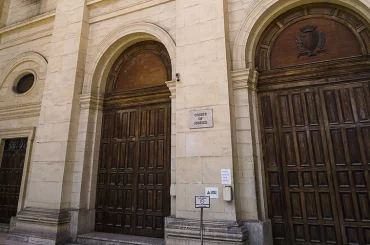The resignation of Education Minister Justyne Caruana now shifts the attention to the ministry's highest official, the permanent secretary, as well as a setpiece of rule-of-law reforms that have yet to have any meaningful effect.
These reforms in 2020 changed the system of appointment of permanent secretaries with the intention of thwarting the kind of sleaze that was last week revealed in the investigation by Standards Commissioner George Hyzler.
The Standards Commissioner’s report now reads like an indictment of the failure of those much-vaunted reforms. Part of the failure is the fact that the permanent secretaries have remained put. So on the one hand we have a law on paper only; on the other we have reforms that have the Prime Minister's (PM) influence on appointments of these key officials by proxy.
Hyzler probed a lucrative assignment given to the former Education Minister’s partner Daniel Bogdanovic, and held that he lacked “competence” to write the report into the matter and compelling circumstantial evidence that Bogdanovic did not even write it. He also wrote that ex-Minister Justyne Caruana used the “power of discretion in a way that constitutes abuse of power.”
One of the setpiece rule-of-law reforms was intended to prevent permanent secretaries from becoming enablers, whether wittingly or passively, in corruption and abuse of power, as has happened throughout the years, but most pervasively in the past few years.
The reform has so far been meaningless because the permanent secretaries that were in place have remained in place
In this case, Hyzler’s report makes uncomfortable reading to the Education Ministry’s permanent secretary.
The idea was that the reform would restore the permanent secretaries’ integral role as key officials tasked with the overarching, supervisory operation of each Ministry. These key officials’ essential role can only be performed well if they remain above partisan loyalties, uninfluenced by change in government, and able to resist any political interference on nonpolicy decisions from the Minister and any of his or her aides.
To achieve this objective, the law was changed in August of 2020. The changes specified that permanent secretaries would start to be appointed by President “in accordance with the advice of the Public Service Commission.” The latter would “give its advice to the President after having received and evaluated the recommendation of the Principle Permanent Secretary.” In turn, the principal permanent secretary, who serves in the Office of the Prime Minister, would be appointed by the President “in accordance with advice of the Cabinet and after consulting the Public Service Commission.”
Such framework was criticized for not going quite far enough from the sphere of influence of the prime minister (PM), who would still be able to influence who gets appointed by proxy.
This is because the PM not only gets to nominate the members of the Public Service Commission (after consulting with the Leader of Opposition), he also gets to nominate the principal permanent secretary to a Cabinet. Of course the Cabinet of Ministers is likely to accept the PM’s choice – any dissenting Minister knows that he would risk losing his job in an eventual reshuffle.
This means that the PM’s quasi-unfettered say on who gets appointed principal permanent secretary gives him a line of influence on who gets appointed as permanent secretary of each Ministry. It is the principal permanent secretary who nominates permanent secretaries of each Ministry to the Public Service Commission for its evaluation. (If the Commission gives a negative evaluation on a nominee, the principal permanent secretary then nominates another, and another if needed, until someone makes it through.)
As such these changes have not severed the PM’s influence on appointment of these key officials.
Yet there is something more basic at play here: these limited legal amendments have had no effect so far because the permanent secretaries that were in place prior to the legal changes have remained in place. These were mostly chosen from partisan lines, so the legal amendments have so far been an exercise in abstraction or in a vacuum.
If we take the case of the permanent secretary in the Education Ministry, Francis Fabri, he has been there since his appointment in 2017. Fabri is a former Labour mayor of Rabat who was due to contest the general election on the Labour ticket in 2008 before pulling out to take a directorship at the Education Ministry.
The Standard Commissioner’s report shows the ease with which the partner or boyfriend of then-minister Justyne Caruana got two direct orders, with the second and most lucrative superseding the first one. In the first one, a yearlong assignment to coordinate structural and refurbishment works at schools – a 30-hour-weekly contract paid at €12.50 an hour, which would net Bogdanovic €19,500 in a year – was prepared just two days after Daniel Bogdanovic was transferred from the Gozo Ministry to the Education Ministry. The Education Ministry then wrote to the Finance Ministry, which is the final arbiter on direct orders, which then gave its approval on 16 December.
Then, on 15 January, the Education Ministry prepared a second direct order to Bogdanovic, this time to conduct a study on the National School of Sports. The Education Ministry then wrote to the Finance Ministry with two requests: to withdraw the first assignment approved a month earlier, and approve the second assignment. The Finance Ministry assented to both requests.
The second assignment was more lucrative: €15,000 for the three-month study which, in Hyzler's words, Bogdanovic was “neither qualified nor competent” to carry out. The investigation by Hyzler also found compelling circumstantial evidence that the study was conducted by another consultant to the minister.
Hyzler’s report also sheds light on how Bogdanovic was chosen. The former minister’s consultant drew up terms of reference, the former minister proposed Daniel Bogdanovic, and the consultant then went to the permanent secretary who in turn proceeded to write to the Finance Ministry to seek formal approval.
The reform in the system of appointment of permanent secretaries in the summer of 2020, prior to the events at the Education Ministry, was intended to make these key officials strong, independent gatekeepers. The point was to have officials who would be vigilant, part of a more robust system of checks and balances that – it is reasonable to assume – would have probably nipped in the bud the second direct order in the Bogdanovic case.
But the reform, even in its limited ways, has so far been meaningless because the permanent secretaries that were in place have remained in place.





